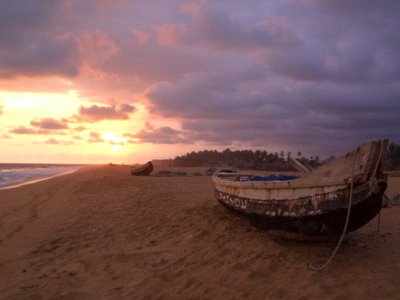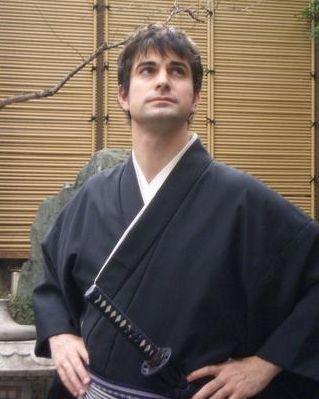
Overall, I would categorise the trip as “awesome” with a third-worldness factor of 10++. Even after living in China and Mexico, West Africa still seemed mega-poor in comparison. Garbage-eating vultures, open sewers, guinea worm parasites; you name it, West Africa has it en masse. Ghana seemed to have more potholes than roads, and Togo means corruption and bad government in the local Ewe language. (Bénin had smooth pavement and laid-back people, but we only saw a tiny slice of the country, so I’ll reserve judgement on that one). Despite the poverty, the trip was faaantastic. The few minor annoyances (over-charging taxi drivers, border hassle) were more than made up for by the super-friendly people who would wave and laugh and ask “Ça va?” every time us silly
yovos walked by. Bonus props to the Ghanaian border guard who bought us all water because we were having trouble digging some Ghanaian change out of our luggage to pay the vendor.
I didn’t really know what to expect on this trip; travelling to some of the poorest countries in the world, with three girls (one of whom had never third-worlded it before), and an ATM card that I didn’t have confidence would work. I’ll let my photos do most of the talking for me, but if you’d like some additional text, both
Jenni and
Ashley’s blogs have excellent travelogue postings about our trip.
“A Detour is a choice between two tasks, each with its own pros and cons”
Accra versus Lomé
Accra (pronounced ah-KRÁ, not AK’ra as I had thought all this time) didn’t really make sense to me as a city. There seemed to be no central commercial area at all, just a lot of disjointed, spread-out buildings high on 70s ‘futuristic’ mishmash and low on colonial charm. Often times we would be driving along in the taxi and I’d have the feeling we were driving down country lanes, not in the middle of a two-million-strong metropolis. I thought the British were supposed to be good city-builders — I’m not sure what they had in mind in Accra, but they certainly didn’t achieve it. I spent most of my time there wondering where the city actually was. And despite the fact that the city has a pretty beautiful beach-side location, you’d hardly know it. The only things down by the water are disused stadia, slums, a prison, and overgrown monuments to past presidents full of crumbling concrete and weeds. The one thing Accra
did have was a sushi restaurant run by real Japanese people! As I stared across the street at it, all I could think of was ‘How on earth did they end up in Ghana?’ —That’d be an interesting story no doubt.
Lomé, by contrast, did feel like a real city – a threadbare city only a palm frond away from falling apart at the seams – but an understandable city nonetheless. The market and commercial area in the centre, administrative buildings over there, residential area over here, and a beautiful (if under-used) beach along the waterfront. Apparently, back in the day, Lomé used to be the hoppin’ and happenin’ hub of West Africa. IR geeks among us might recognise the Lomé Convention which gathered together all the developing world movers and shakers in order to gain preferential access to the EU market of their former colonial overlords. But that was way back in 1975 before greedy graft and corrupt politics took over and wound Lomé down into the sleepy afterthought it is today. I dug the sandy streets, cool palm-lined boulevards and rare colonial building that would peek out behind the bougainvillea.
“A Roadblock is a task which only one team member may perform”
In my case, that would be using my French to deal with belligerent Togolese taxi drivers who took us down scary dirt tracks at night, in the dark, in the middle of nowhere, in order to avoid paying-off the guards at military checkpoints along the main route (thereby saving himself somewhere in the region of 50¢). Other than this situation, I was happy to be able to put my French to use in a non-work environment for once. Finally it comes in handy! And I was also happy that K and Jenni held their own in French –I didn’t have to be the intermediary in all their market haggling and restaurant ordering.
Bon travaille K and Jenni!
Deux étoiles d'or!
It was also great to be able to speak French without struggling with a France-y French pronunciation. I could be as flat I wanted because it was easier for the people there to understand. I loved it! I wish I could do the same at work too, unfortunately I don't think that would fly with the
pure laine Québécois.
Another thing I was called on to do a few times by K was to 'be the man' in dealings with officials and drivers. I think this offended Jenni's feminist sensibilities, but that's just the way things are over there. Generally K would start off the bargaining, (she obviously knew much more about it than anyone else), and I would standby in case the haggling started to take a turn south 'cause K was getting no props from the men. Then I'd step in and wow them with my superior and monotone French, announcing that
XXX was our final price. Generally I think our "good cop, bad cop" routine got us good results and fair prices (even if our taxi drivers didn't always know where they were going).
“Warning: Yield Ahead”
The people, food, history, beaches and culture all make West Africa a fantastic travel destination. The only major drawback in my mind (apart from parasites of course) was the transportation system – or more correctly, the lack thereof. Getting from A to B seemed to be the cause of pretty much all our hassles and headaches during the trip. Since all transportation is essentially private vehicles being hired out, you're always dealing with aggressive touts, 'the tourist price', dilapidated, rusting vehicles spewing exhaust and drivers who don't know the way. Now I realise that these governments have a priority to feed their people ahead of building zippy expressways and nice trains, but the serious lack of infrastructure can only exacerbate the region's poor economic development. Companies aren't exactly going to be jumping over each other to invest in a place where it might take almost four hours to move their goods 120 kms (as it took us to travel from Accra to Cape Coast).
But like I said, everything else was amazing, and I wouldn't let a couple of hot and dusty taxi rides across the savannah deter anyone from having their very own West African adventure. Here are my hot tips and quick picks for anyone out there considering a jaunt to 'the Dark Continent':
HIGHLIGHTS:
• the beaches, especially Anomabo Beach in Ghana
• the food, especially gari foto (like couscous), Jollof rice (kind of fried rice), brochettes (spicy grilled meat on sticks), and palava sauce
• village visit
• market shopping (somehow always immensely more satisfying that shopping in a store)
• If you use a digital camera, be sure to show people the pictures you take of them – they love it
• Eat at 'Country Kitchen' in Accra for some dee-licious food with fancy Ghanaians
IF I'D HAD MORE TIME:
• Mole National Park in the north of Ghana is supposed to be the best place in the world to get close to elephants
• Abomey in Bénin was the capital of a huge West African kingdom in pre-colonial days and you can visit the restored palaces
• Tamberma country in the isolated far north of Togo where people live in fortress-like homes built for protection against slave-raiders from Abomey
• Kumasi in central Ghana reportedly has the best market in West Africa and palaces of the Asante kings dot the city
So, what are you waiting for!? Go buy your ticket already!


